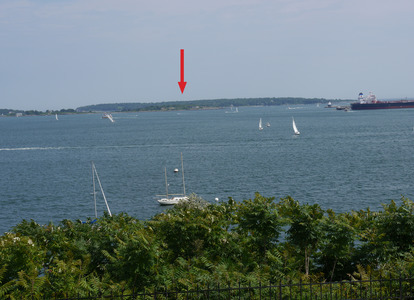Eastern Promenade - House Island
BackEastern Promenade - House Island
View from the Eastern Promenade, Fort Allen Park
Travel down Vesper Street to the Eastern Promenade. The park that is Eastern Promenade was a product of the Olmstead Brothers’ design firm, who also designed Baxter Boulevard. The Olmstead brothers were the sons of Frederick Law Olmstead, considered the father of American landscape architecture and famous for designing sites like Central Park in NY. Ahead of you and to your left is the beautifully landscaped Fort Allen Park overlooking Casco Bay. Looking out to sea and slightly right (see photos), you can spot House Island and Fort Scammel.
Fort Scammel was built on House Island in 1808 as part of the national seacoast system of fortifications. It is now privately-owned, and in 2015, the Portland City Council designated it as a local historic district. However, imagine the island in the early 1900s. From 1907 to 1937, House Island was the site of an immigration quarantine station, nicknamed the ‘Ellis Island of the North’. There was a brick hospital, a wooden detention building, and a doctor’s residence. Prior to 1906, immigrants were processed at the U.S. Custom House (99 Commercial Street), where about 4,000 people came through annually during the 1890s. The Travelers Aid Society, originally begun by the Young Women’s Christian Association (YWCA), worked with detainees to provide translation services and entertainment.
The quarantine station on House Island was busiest in the early 1920s, after the adoption of the 1921 U.S. Emergency Quota Act, which restricted the number of immigrants who could enter the U.S. In November 1923, the ships USS President Polk and USS George Washington were diverted from New York City and sent to Portland. We know that 218 immigrants from those ships – many of whom were Jews from Russia - were quarantined at the station. Government immigration officials liked the location as it was secure and inexpensive to police. We should also note that a month earlier, in October 1923, the Maine Klu Klux Klan (which claimed 150,000 members in the state) successfully lobbied to exclude Catholics, Negroes (sic), Jews, and Italians from Portland city elections. In the 1923 municipal elections, the City Council became all-Protestant and minorities were effectively disenfranchised from city government. In this context of overt racism, Jewish women stepped up. The Portland section of the National Council of Jewish Women (NCJW), which had just been founded in 1920, provided active support to Jewish immigrants on House Island, including setting up a kosher kitchen on the island.

